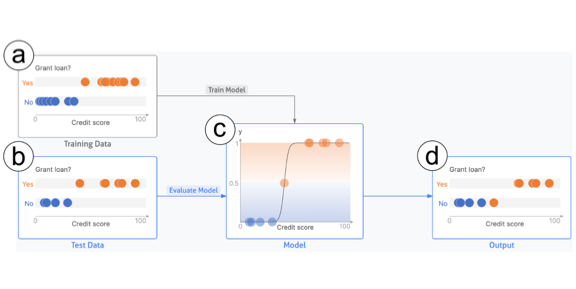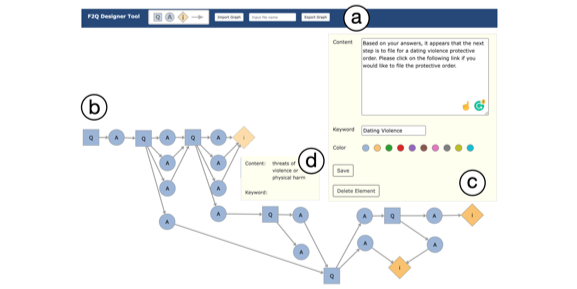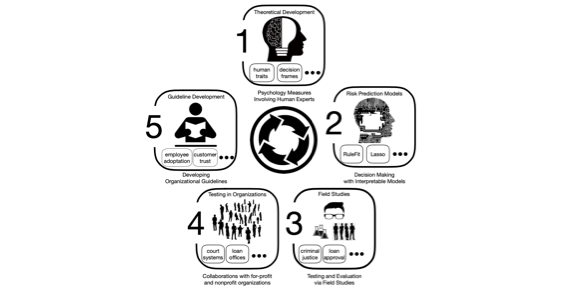|
|
|
|
|
|
|
|
|
Award Duration |
|
|
|
November 1, 2021 to October 31, 2024 (plus NCE until May 31, 2025) |
|
|
|
PI and Point of Contact |
|
|
|
Bei Wang Phillips (PI, University of Utah)
Arul Mishra (Co-PI, University of Utah)
Himanshu Mishra (Co-PI, University of Utah) |
|
|
|
Overview |
|
|
|
Artificial Intelligence (AI) systems have been used for predicting different risks -- financial, business, medical, and legal risks -- and have been argued to perform better than human experts. The main focus of AI systems has been to predict accurately, but research shows that sometimes they end up discriminating against protected groups. A lack of focus on equity can adversely impact the well-being of millions of people as well as pose legal and ethical challenges for the organization. |
|
|
|
Educational Objectives |
|
|
|
Algorithms take decisions autonomously or serve as decision aids to make human decision efficient. However, it is important that algorithms not just be efficient and accurate in their decisions, but they are also fair and equitable to people, irrespective of group affiliation. Therefore, it is imperative to understand the accuracy-equity trade-off inherent in using algorithms in everyday decisions. Two courses will be developed, one in the Business School and the other in the School of Computing, offered at the graduate and undergraduate level, considering the importance of fairness in AI. The aim of the two courses is to understand the use of fair algorithms for social and organizational decisions, especially as it pertains to the steps that must be monitored while algorithms are designed, developed, and deployed. |
|
|
|
Educational Objectives Achieved |
|
|
|
Fall 2025: CS 3090 - Ethics in Computing (Educational Modules) Fall 2024: CS 3090 - Ethics in Computing (Educational Modules) Fall 2023: MKTG 6600 - Algorithms for Business Decisions (Educational Modules) Spring 2023: CS 3960 - Algorithm Fairness in Machine Learning (New Course Development)
Spring 2022: MKTG 4650/6650 - Fair Algorithms for Business Decisions (New Course Development) Fall 2022: MKTG 6600 - Algorithms for Business Decisions (Educational Modules) |
|
|
|
Publications |
|
|

|
 VISLIX: An XAI Framework for Validating Vision Models with Slice Discovery and Analysis.
VISLIX: An XAI Framework for Validating Vision Models with Slice Discovery and Analysis.
Xinyuan Yan, Xiwei Xuan, Jorge Piazentin Ono, Jiajing Guo, Vikram Mohanty, Shekar Arvind Kumar, Liang Gou, Bei Wang, Liu Ren. Eurographics Conference on Visualization (EuroVis), 2025. Supplement. Supplement Video. DOI:10.1111/cgf.70125 arXiv:2505.03132. |

|
 Exploring Visualization for Fairness in AI Education.
Exploring Visualization for Fairness in AI Education.Xinyuan Yan, Youjia Zhou, Arul Mishra, Himanshu Mishra, Bei Wang. IEEE Pacific Visualization Symposium (PacificVis), 2024. Supplementary Material. DOI:10.1109/PacificVis60374.2024.00010 |

|
 From Flowchart to Questionnaire: Increasing Access to Justice via Visualization.
From Flowchart to Questionnaire: Increasing Access to Justice via Visualization.
Youjia Zhou, Arul Mishra, Himanshu Mishra, Bei Wang IEEE Workshop on Visualization for Social Good (VIS4Good), pages 11-15, 2023. Supplementary Material. DOI:10.1109/VIS4Good60218.2023.00009 |

|
 Humans as Mitigators of Biases in Risk Prediction via Field Studies.
Humans as Mitigators of Biases in Risk Prediction via Field Studies.Bei Wang, Arul Mishra, Himanshu Mishra. IEEE International Conference on Big Data (IEEE BigData), 2022. DOI: 10.1109/BigData55660.2022.10020306 |
|
|
|
Students |
|
|
|
Xinyuan Yan (U of Utah, CS PhD student) |
|
|
|
Acknowledgement |
|
|
|
This material is based upon work supported or partially supported by USHE under its Deep Technology Initiative. |
|
|